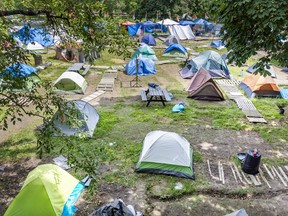The Montreal and Quebec governments and police have left the university to its own devices and hold it to a perplexing double standard regarding the pro-Palestinian camp on its grounds. Why?

Although protesters denied it, it was widely assumed that the vandalism was connected to the pro-Palestinian encampment that had taken root across the street two weeks earlier, demanding that the Caisse divest from some $14 billion in holdings that protesters say could be supporting Israel’s war in Gaza.
“We’re starting to see the consequences of this passive approach,” he fumed, in thinly disguised criticism aimed at the City of Montreal and Mayor Valérie Plante’s wait-and-see approach to the demonstration. “We expect all our political leaders to denounce this kind of excess and the occupation of public space.”
Within 36 hours, the fortified cluster of tents was gone from Victoria Square. Montreal police moved in at dawn Friday and roused the dozen or so protesters sleeping on site. They were herded outside and brought back one by one to collect their belongings. Only one person was arrested, a man alleged to have shone a laser in the eyes of a police officer at an earlier rally.
But that was that. The tents that had sprouted in the plaza in late June were ousted without major incident. Existing laws and regulations were applied with no one having to turn to the courts for a special order.
Yet the tarpaulins, canopies and wooden sidewalks that have monopolized the lower field of McGill University since April 27 have been left to fester, despite the administration’s various attempts to dislodge them and repeated pleas for police, the city and the province to help.
McGill appears to have been left to its own devices to cope with a vexing quandary, even as tensions in the nine-month-old war between Israel and Hamas rise. The question is why.
The camp at McGill was the first in Canada as a wave of demonstrations in solidarity with the Palestinian cause took over university campuses across North America. Now it is the last left in the city and the longest-running in the country.
The camp in Victoria Square that was set up on June 22 was Montreal’s third pro-Palestinian encampment and the city’s shortest-lived installation.
After Bonnardel’s outburst, Plante changed her tune.
“You can’t occupy a public site permanently no matter what the cause,” she said in explaining why Montreal police and city cleanup crews finally went into Victoria Square. “Public space must remain public.”
But when asked if the police would soon be going in to clear the McGill encampment, as university president Deep Saini has repeatedly begged, Plante turned the tables.
“This is where I find the dean and McGill University have failed compared to other universities that were able to find a solution and a peaceful way, because that’s what people expect — that it will be a peaceful way out of it. I expect McGill University to revise their strategy,” Plante said. “Everybody expects from the dean of such an important institution — it’s McGill University — to find the right path, because right now their reputation is being tainted, by their incapacity to find a way out.”
“They chose that path, to go in court, and now it’s locked to this decision that will be made by the court,” Plante said. “I think it’s important for people to understand that. They took that path, so now they have to be accountable for that.”
Plante’s comments are not only curious, they’re completely disingenuous.
But Plante’s finger-pointing at McGill is also perplexing given that UQAM went to court as well. And so did the University of Toronto. In fact, an Ontario court last week ordered the U of T encampment to be cleared. Demonstrators there left of their own accord to avoid a clash with police.
McGill was among the first to turn to the justice system for relief. Bonnardel said at the time he supported the injunction request, even after the judge denied it back in May for being “ill founded.” But a lot has happened since. McGill has another court date this month to try to get that make-or-break injunction.
Demonstrators who stormed McGill’s James Administration Building in June were hastily ejected by riot cops.
But the encampment remains firmly entrenched.
“This needs to stop,” Saini said in another statement that seems destined to be ignored — even as activities on McGill’s campus risk becoming even more of a flashpoint.
Over the weekend, the group Palestine Action Montréal urged protesters to “escalate” their activities beyond “symbolic action.”
“We know power won’t move unless we strike fear in the heart of the ruling class and pose a threat to their reproduction of capital,” it said. “We will not disavow any actions taken to escalate the struggle, including militant direct actions.”
Perhaps that not-so-thinly veiled threat will finally prompt a show of concern from authorities.
Since the beginning, McGill has been walking a tightrope between the rights of protesters to peaceful assembly and its own private property rights. It has gone out on a limb trying to balance respect for free expression with the concerns of some students and the wider Jewish community that its campus had become a hotbed of antisemitism, intimidation and hate speech. It has tried carrots and sticks. It has attempted talks and legal remedies.
But one of Quebec’s most renowned and respected institutions has been left to navigate these rocky shoals alone, while being held to a dubious double standard that it is somehow responsible for this unpredictable predicament over which it has no control.
Is the university a convenient foil for politicians who fear risking their own hides by taking a strong stand? Or is McGill being hung out to dry?